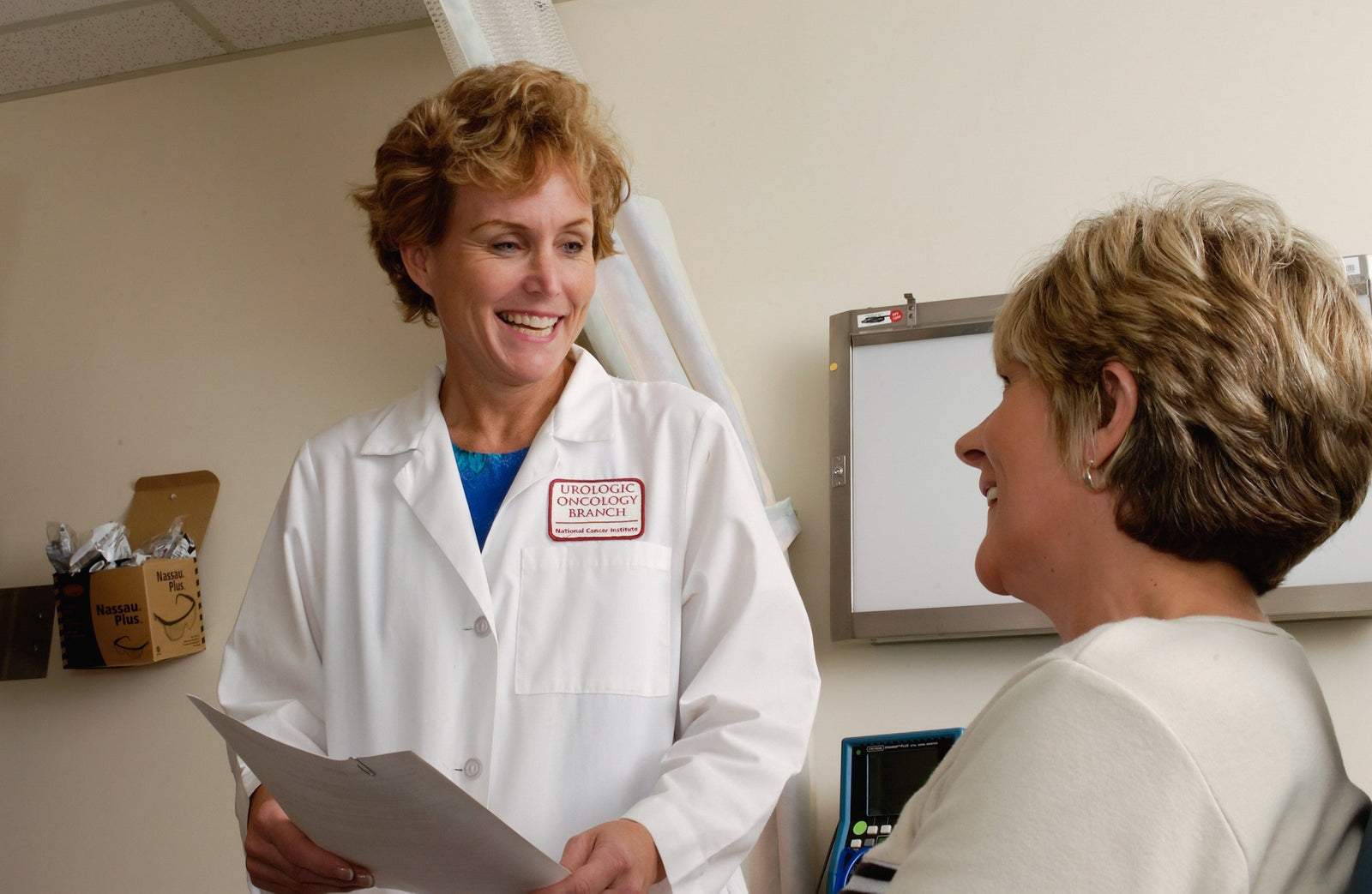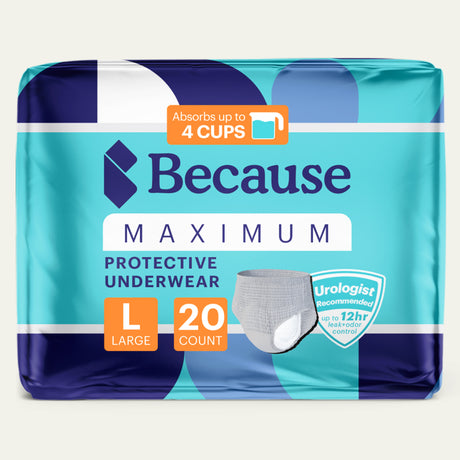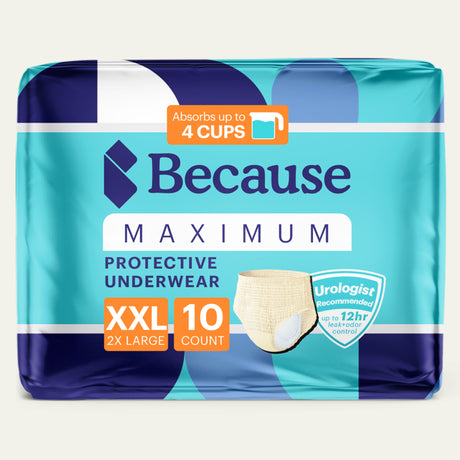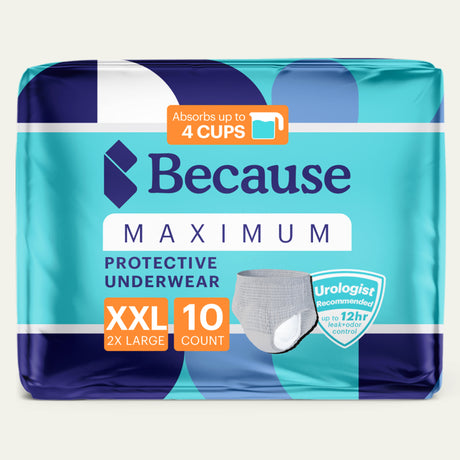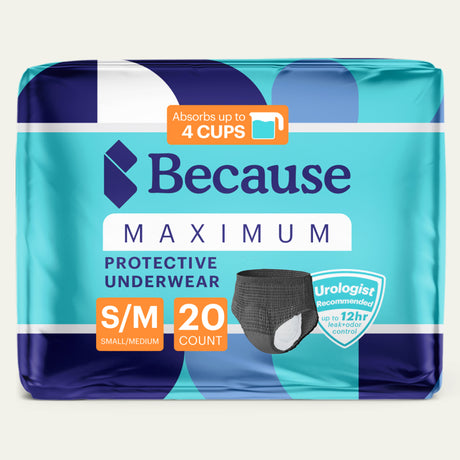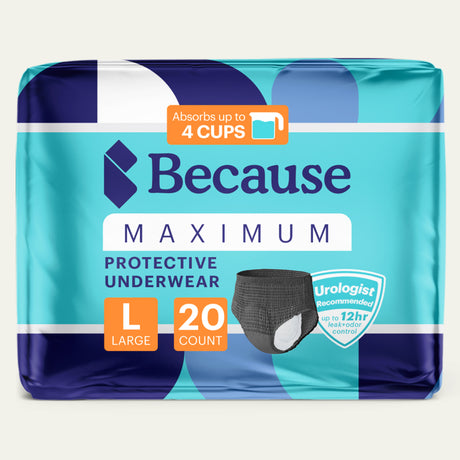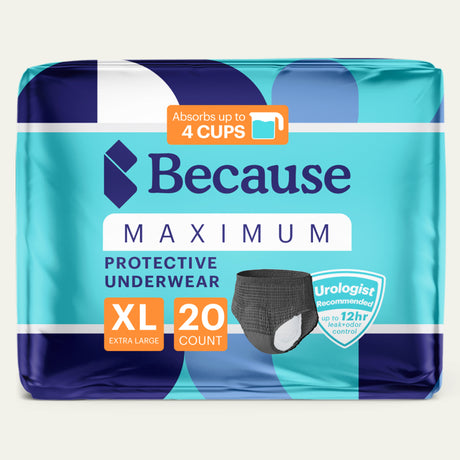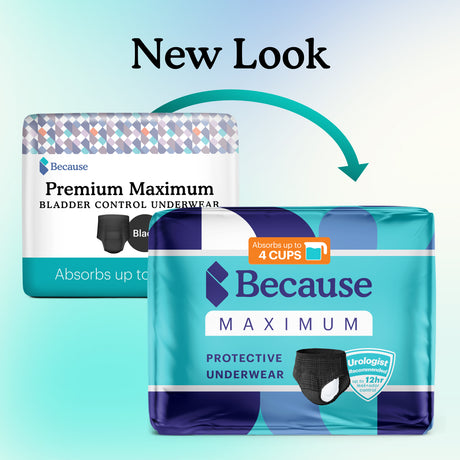Medically reviewed by Dr. Kerac Falk, MD, FACOG.
As of 2021, there were more than 13,000 practicing urologists in the United States. These specialists diagnose and treat a variety of conditions, including recurrent urinary tract infections (UTI), benign prostatic hyperplasia (BPH), painful bladder syndrome, kidney and bladder stones, erectile dysfunction (ED), urinary incontinence, urinary retention, and hematuria (bloody urine) in men and women. In addition, they also play a role in the treatment of prostate cancer, the second most common cancer in men, as well as cancer of the bladder and kidneys.
Whether you’re seeing a urologist to discuss prostate problems, sexual dysfunction, incontinence, or symptoms of other common urological conditions, being prepared for your appointment can help you make the most of your visit. That means knowing what questions to ask during your physical exam and consultation. To help you get ready, we’ve put together this list of some of the most common questions to ask your doctor.
 11 Essential Questions To Ask Your Urologist
11 Essential Questions To Ask Your Urologist
When discussing problems with your urinary system with your new doctor, bring along this list of questions to help guide the conversation.
1. What Could Be Causing My Symptoms?
In some cases, you may head to your first appointment with some idea about what medical condition you have. For example, your primary care physician may have already diagnosed you with a type of urinary incontinence, or you may have visited the emergency room and been told you have kidney stones. It’s also possible that you will go into the appointment without any idea of what’s causing your urinary issues.
Whatever your story is, asking your doctor what the possible causes of your symptoms are is a good starting point. Because they’re an expert in urological medicine, the urologist can give you a second opinion about whether you received an accurate diagnosis if you have already seen a doctor. If not, they can review the most common causes of the symptoms you describe.
2. What Are the Potential Diagnoses for My Condition?
Many health conditions have symptoms in common. For example, symptoms of an enlarged prostate, which include having a difficult time urinating and nocturia (urinating frequently at night), may also be caused by a UTI or prostatitis (prostate inflammation). As a result, it’s a good idea to discuss potential diagnoses with your new urologist. In addition, find out what information they will use to determine which condition you have. 3. What Tests or Screenings Do You Recommend and Why?
3. What Tests or Screenings Do You Recommend and Why?
Next, find out what tests and screenings your urologist recommends based on your symptoms, age, medical history, and other factors. Ask what the purpose of each test is and what it involves. You can also inquire about the possibility of further tests in the future.
Some tests that your doctor may order include:
- Urinalysis: An analysis of the appearance, concentration, and content of a urine sample
- Urine cultures: A test to determine if there are bacteria present in your urine, and what antibiotics may be effective
- 24-hour urine test: A test where you collect urine for 24 hours so that it can be tested for levels of certain substances
- PSA test: A blood test that measures the amount of prostate-specific antigen (PSA) in a sample and is commonly used for prostate cancer screening
- Other blood tests: Your doctor may test your blood for creatinine and blood urea nitrogen (BUN) to see how well your kidneys are functioning. A testosterone blood test may be ordered if you have symptoms of erectile dysfunction, as low testosterone is a common cause of ED.
- Imaging tests: Your doctor may order an x-ray, CT scan, ultrasound, and/or cystoscopy, so they can look for problems with your kidneys, bladder, ureters, testicles, prostate, or another part of your urinary system.
- Seminogram: An analysis of a semen sample to assess your sperm quality, motility, and quantity compared to normal semen
4. What Are the Potential Treatment Options for My Condition?
Once your urologist arrives at a diagnosis, ask about effective treatments for the condition. Chances are, there will be more than one treatment option available. Your urologist may decide to try more conservative treatments like medications and lifestyle changes first and then recommend more invasive treatments like surgery later on as needed.
5. What Are the Potential Benefits and Risks of Each Treatment?
As you discuss options for your treatment plan, inquire about the potential benefits of medications and other treatments. For example, you might ask what the success rate is for a specific surgical procedure or what percentage of patients see a significant impact from a particular drug.
In addition, ask about the risks for complications and side effects and whether you have any risk factors that could make you more likely to experience potential negative effects. Together, you and your doctor can weigh the benefits and risks of the potential treatments to decide which is right for you.
 6. Are There Any Lifestyle Changes I Should Consider To Improve My Urological Health?
6. Are There Any Lifestyle Changes I Should Consider To Improve My Urological Health?
During your appointment, ask what things you can do to promote a healthy bladder and urinary system. Depending on your diagnosis, your urologist may recommend that you make changes to your diet, exercise regularly, quit smoking, cut back on your alcohol intake, and/or prioritize your mental health to alleviate stress.
If you’ve been diagnosed with urinary incontinence, your urologist may recommend that you perform pelvic floor exercises at home, or with the help of a pelvic floor physical therapist. One of the most common is the Kegel, which involves tightening your pelvic floor muscles and then releasing them. With daily practice, these exercises can help strengthen your muscles to reduce the risk of urine leakage. Fluid management, timed voiding, and bladder retraining are also helpful conservative options.
7. How Can I Manage Pain or Discomfort Associated With My Condition?
Pain, frequent urination, and other symptoms of common conditions can interfere with your daily life. Find out what you can do to alleviate discomfort while you wait for treatments to take effect. For example, can you take over-the-counter pain relievers or use a warm or cool compress for pain relief?
8. What Is the Long-Term Outlook for My Condition?
Once you’ve discussed your immediate next steps, ask what you can expect over the long term. Will treatments and a healthy lifestyle be enough to manage your condition for a long time, or are your symptoms likely to worsen in the near future? Does your condition put you at a higher risk for any other health problems? Should you be on the lookout for any symptoms or side effects that may indicate a medical emergency?
You may also want to ask your urologist how much experience they have in treating your condition.
 9. Are There Any Alternative or Complementary Therapies Worth Exploring?
9. Are There Any Alternative or Complementary Therapies Worth Exploring?
A quick search of the internet reveals a multitude of alternative and complementary therapies for a variety of urologic conditions from overactive bladder to Peyronie’s disease. In many cases, there just isn’t enough research to know whether these natural remedies work and many pose risks for side effects and health complications. As a result, it’s wise to discuss alternative and complementary therapies with your urologist before trying them.
10. What Steps Can I Take To Prevent Future Urological Issues?
In addition to making lifestyle changes like sticking to a healthy diet, there may be other things that you can do to reduce your risk of future problems. For example, your urologist may advise you to stop smoking, discuss treatments for high blood pressure with your primary care doctor, or see a specialist about chronic constipation.
11. What Can I Do To Manage My Symptoms at Home?
Finally, discuss self-care with your urologist. They can provide you with tips on things that you can do to improve your quality of life. They might suggest that you use bladder protection underwear to manage incontinence symptoms, for example.
Why Create a List of Urology Questions Before Your Appointment?
Preparing a list of urologist questions to ask when you visit a specialist for the first time can be beneficial for four big reasons. Let’s look at each one.
Maximize Your Time
When you know what urology questions to ask, you can make the most of your scheduled time with the doctor. You won’t have to worry about drawing a blank and delaying your appointment.
Ensure a Comprehensive Discussion
Asking for answers to your specific questions can help guide the conversation with your urologist, so you don’t miss any important points. While you can always contact your doctor later with additional questions, it’s best to cover as much as you can during your initial appointment.
Empower Yourself
Many of the topics related to the urologic medical field like incontinence and sexual activity are sensitive topics. While you don’t need to feel embarrassed discussing things like sexual intercourse or urine leakage with your healthcare provider, you may find the idea of doing so daunting. Having questions prepared ahead of time can help you feel more confident, empowering you to have honest conversations with your doctor.
Reduce Anxiety
Seeing a new doctor can be stressful for many people. Arriving at an appointment with a list of questions to ask can help you feel more in control and ease anxiety.
How To Prepare for Your First Urology Appointment
In addition to compiling a list of urology questions, do the following to get ready for your appointment.
Gather Relevant Medical History and Records
Knowing that you have an underlying condition or a close relative with a urinary problem can help your urologist make an accurate diagnosis. Make arrangements to have your medical records sent to your urologist before the day of your appointment.
You may also want to have conversations with your immediate family members about any health conditions that they have. This way, you can let your urologist know if you have a family history of prostate cancer, testicular cancer, kidney stones, or other conditions.
Write a List of Symptoms and Concerns
Before your appointment, jot down a complete list of your symptoms and concerns. It can be helpful to keep a symptom diary, where you record what’s going on with your body on a day-to-day basis. Consider adding information like when your symptoms occurred, what activities you were doing, and what you ate and drank during the day.
Get Familiar with Common Urological Terminology
Your urologist should be able to explain complex urology terms simply to help you better understand your condition. However, it’s a good idea to know some basic terminology to make conversations with your doctor simpler. The University of Virginia School of Medicine offers a great glossary of urology terms that can help you prepare for your appointment.

What To Expect at Your First Urology Appointment
When you arrive at your urology appointment, you’ll typically be given paperwork to fill out. In addition to providing your billing information, you’ll likely need to fill out a questionnaire related to your symptoms and medical history.
You’ll typically be asked to provide a urine sample, so be sure to arrive with a full bladder. Once you’re in the exam room, your urologist will ask about your symptoms and explore your medical history. Then, the doctor will usually perform a physical examination. For men, this will usually include an examination of the penis and a prostate assessment that involves a quick rectal exam. Women may undergo a pelvic exam during the appointment. You may also have your bladder scanned for emptying or drained with a small catheter.
After the physical examination, your urologist will be ready to discuss testing, diagnosis, and treatments. At this point, you can refer to your list of urology questions to guide the conversation. The appointment will conclude with a discussion of your next steps, and your urologist will tell you when to schedule your next visit.
The Importance of Communication and Establishing a Long-Term Plan
The good news about sexual health and urinary problems is that most of them can be managed with the right treatment plan. Consider your initial appointment as the starting point for an ongoing partnership with your urologist. Keep the lines of communication open by sharing information about your symptoms, any side effects you experience, and your concerns as you embark on your treatment plan, so your urologist can make necessary changes to your plan as needed and help you continue to progress toward your health and wellness goals.
Are you struggling with incontinence? Take our bladder protection quiz and get a sample pack to try.
If you're struggling with incontinence, join one of our private support groups today!
Women's Incontinence Support Group
Men's Incontinence Support Group
About the Expert:
Dr. Falk is a fellowship-trained urogynecology subspecialist, double board-certified in both Obstetrics and Gynecology, as well as Female Pelvic Medicine and Reconstructive Surgery. He has expertise in the treatment of female pelvic floor disorders, which encompass many common but infrequently-discussed conditions which significantly impact women’s quality of life. These include complex disorders such as urinary and bowel incontinence, pelvic organ prolapse, childbirth injury, genital fistulas, recurrent urinary tract infection, and bladder pain.
Sources:
American Urological Association. (2022, February 17). The American Urological Association Releases 2022 AUA Census Results [Press release]. PR Newswire. https://www.prnewswire.com/news-releases/the-american-urological-association-releases-2022-aua-census-results-301800339.html
World Cancer Research Fund. (n.d.). Prostate Cancer Statistics. https://www.wcrf.org/cancer-trends/prostate-cancer-statistics/
University of Virginia Health System. (n.d.). Glossary of Terms. https://med.virginia.edu/urology/for-patients-and-visitors/glossary-of-terms/
